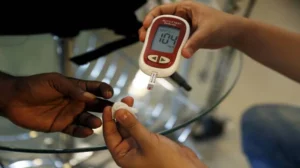Diabetes, a chronic health condition affecting millions worldwide, poses significant challenges to both individuals and healthcare systems. Characterized by elevated blood sugar levels, this disorder comes in various forms, each with unique causes and implications. Understanding diabetes is crucial for effective management and maintaining a healthy lifestyle. In this comprehensive guide, we delve into the diabetes causes, symptoms, and treatment options to help you.
Contents
What Are The Causes Of Diabetes?
 The causes of diabetes vary depending on the type. Here’s a breakdown of the causes for each major type of diabetes:
The causes of diabetes vary depending on the type. Here’s a breakdown of the causes for each major type of diabetes:
Type 1 Diabetes
- Autoimmune Reaction: Type 1 diabetes is primarily caused by an autoimmune reaction where the body’s immune system mistakenly attacks and destroys the insulin-producing beta cells in the pancreas. The exact reason why this autoimmune reaction occurs is not fully understood.
- Genetic Factors: There is a significant genetic component, as the risk increases if a family member has the disease. However, not everyone with a genetic predisposition develops type 1 diabetes, suggesting environmental factors also play a role.
- Environmental Triggers: Some theories suggest that viral infections might trigger the autoimmune response. However, no specific virus has been conclusively linked to type 1 diabetes.
Type 2 Diabetes
- Insulin Resistance: This is the primary cause of type 2 diabetes. It occurs when cells in the muscles, fat, and liver start resisting or ignoring the signal that the hormone insulin is trying to send out—to get glucose from the bloodstream into our cells. This resistance leads to higher blood sugar levels.
- Overweight and Obesity: Excess weight, particularly when fat is concentrated around the abdomen, is a major cause of insulin resistance. However, not everyone who is overweight will develop type 2 diabetes.
- Lifestyle Factors: Poor diet, lack of physical activity, and being overweight significantly increase the risk of developing type 2 diabetes.
- Genetics: Like type 1 diabetes, family history plays a role. People with a family history of diabetes are more likely to develop it.
- Age and Ethnicity: The risk of type 2 diabetes increases as you get older, especially after age 45. It’s also more common in certain ethnic groups.
Gestational Diabetes
- Hormonal Changes: During pregnancy, hormonal changes can make the body’s cells less responsive to insulin.
- Weight: Being overweight before pregnancy increases the risk.
- Genetic and Environmental Factors: These can also contribute to the development of gestational diabetes.
Other Types of Diabetes
- Some other types of diabetes, such as monogenic diabetes (resulting from mutations in a single gene) and cystic fibrosis-related diabetes, have different causes and are much rarer than type 1 and type 2 diabetes.
It’s important to note that while some factors like family history can’t be changed, others, particularly those related to type 2 diabetes, can often be addressed through lifestyle changes like diet, exercise, and weight management.
What Are The Main Symptoms Of Diabetes?
 The symptoms of diabetes can vary depending on the type and severity of the condition. However, several common signs and symptoms may indicate the presence of diabetes:
The symptoms of diabetes can vary depending on the type and severity of the condition. However, several common signs and symptoms may indicate the presence of diabetes:
- Increased Thirst and Urination: High blood sugar levels cause the kidneys to try to filter and absorb the excess sugar. When they can’t keep up, the excess sugar is excreted into the urine, dragging along fluids from your tissues, and leading to dehydration. This triggers more frequent urination, which may leave you dehydrated and thirsty.
- Fatigue: When your cells are deprived of sugar, you may become tired and irritable.
- Blurred Vision: High levels of blood sugar can lead to a swelling of the lenses in your eyes, causing blurry vision.
- Unexplained Weight Loss: Despite eating more than usual to relieve hunger, you may lose weight. Without the ability to metabolize glucose, the body uses alternative fuels stored in muscle and fat. Calories are lost as excess glucose is released in the urine.
- Increased Hunger: Insulin resistance or lack of insulin can prevent your body from getting glucose from the blood into the body’s cells to use as energy. This can make you feel hungrier and eat more, leading to weight gain.
- Slow-Healing Sores or Frequent Infections: High blood sugar levels can affect blood flow and cause nerve damage. This makes it harder for your body to heal wounds.
- Tingling, Numbness, or Pain in Hands/Feet: This is known as neuropathy, which occurs over time due to persistent high blood sugar levels damaging the nerves.
- Darkened Skin in Certain Areas: This is known as acanthosis nigricans and is common in those with type 2 diabetes. It causes dark, thickened patches often on the neck, armpits, and groin.
- Red, Swollen, Tender Gums: Diabetes may weaken your ability to fight germs, increasing the risk of infection in your gums and in the bones that hold your teeth in place.
It’s important to note that in the early stages, type 2 diabetes may not cause any symptoms. For diabetes causes symptoms and treatment, options may vary and should be consulted with a healthcare professional. Regular check-ups with a healthcare provider can help with early detection and management of diabetes.
Can Eating Too Much Sugar Cause Diabetes?
Eating too much sugar in itself does not directly cause diabetes. However, consuming excessive amounts of sugar can lead to several health issues that may increase the risk of developing diabetes, particularly type 2 diabetes. Here’s how the connection works:
- Weight Gain and Obesity
Eating too much sugar, especially in the form of sugary drinks and high-calorie foods, can contribute to weight gain. Obesity is a significant risk factor for developing type 2 diabetes. When the body carries excess weight, especially in the abdominal area, it can cause cells to become resistant to insulin.
- Insulin Resistance
A diet high in sugar and refined carbohydrates can lead to spikes in blood sugar and insulin levels. Over time, this can strain the pancreas and lead to insulin resistance, where the body’s cells do not respond effectively to insulin. Insulin resistance is a precursor to type 2 diabetes.
- Metabolic Syndrome
A diet high in sugar may contribute to a cluster of conditions known as metabolic syndrome. This includes increased blood pressure, high blood sugar, excess body fat around the waist, and abnormal cholesterol levels. Metabolic syndrome increases the risk of type 2 diabetes.
It’s important to differentiate between cause and risk factors. While a high-sugar diet in itself is not a direct cause of diabetes, it contributes to several risk factors that increase the likelihood of developing the disease, particularly type 2 diabetes.
What Is The Best Treatment For Diabetes?
 The best diabetes treatment depends on the type of diabetes and the individual’s specific health situation. However, the main goals of diabetes treatment are to manage blood sugar levels, prevent complications, and maintain overall health. Here’s a general overview of the treatment approaches for the most common types of diabetes:
The best diabetes treatment depends on the type of diabetes and the individual’s specific health situation. However, the main goals of diabetes treatment are to manage blood sugar levels, prevent complications, and maintain overall health. Here’s a general overview of the treatment approaches for the most common types of diabetes:
Type 1 Diabetes
- Insulin Therapy: Since the body doesn’t produce insulin, all people with type 1 diabetes need to take insulin. Insulin is typically injected through the skin into the fatty tissue below. Insulin pumps and continuous glucose monitors (CGMs) are also commonly used.
- Carbohydrate Counting: Patients need to be aware of the amount of carbohydrates in their food and adjust their insulin doses accordingly.
- Frequent Blood Sugar Monitoring: Regular monitoring is crucial to ensure that blood sugar levels remain within the target range.
- Healthy Lifestyle: This includes a balanced diet, regular physical activity, and maintaining a healthy weight.
- Regular Check-Ups: Regular health check-ups are important to monitor for complications of diabetes, such as heart disease, kidney problems, and eye issues.
Type 2 Diabetes
- Lifestyle Changes: This includes a healthy diet, regular physical activity, and weight loss if the person is overweight. These changes can significantly impact blood sugar levels and may be enough for some people to manage their type 2 diabetes effectively.
- Medications: If lifestyle changes aren’t enough, medications can help. There are many types of medications available, each working in different ways to lower blood sugar. Metformin is often the first medication prescribed.
- Monitoring Blood Sugar: Regular monitoring can help with managing the condition effectively.
- Insulin Therapy: Some people with type 2 diabetes may also need insulin therapy as the disease progresses.
Gestational Diabetes
- Diet and Exercise: Managing carbohydrate intake and staying physically active are key.
- Blood Sugar Monitoring: Frequent monitoring can ensure that blood sugar levels stay within a safe range.
- Medication: If diet and exercise aren’t enough to control blood sugar, medication or insulin may be needed.
Anyone with diabetes must work closely with their healthcare team to create a treatment plan tailored to their individual needs. This plan may change over time based on health status, blood sugar levels, and other factors.
Conclusion
In conclusion, diabetes causes, symptoms, and treatment is a complex condition with various types. And, each with its own set of causes ranging from genetic factors to lifestyle choices. While symptoms like increased thirst, fatigue, and blurred vision can be common across types, the approach to treatment varies, emphasizing the importance of insulin in type 1, and lifestyle changes and medication in type 2. It’s a myth that eating too much sugar directly causes diabetes. But it’s important to remember that a diet high in sugar can lead to weight gain and increase the risk of type 2 diabetes.
Managing diabetes effectively requires a combination of medical care, lifestyle adjustments, and staying informed about the condition. Do you want to get rid of diabetes? Join our online diabetes treatment program and reverse Diabetes naturally through lifestyle changes such as a Personalized Diet plan, Exercise, Yoga, dieticians, and health coaches.

